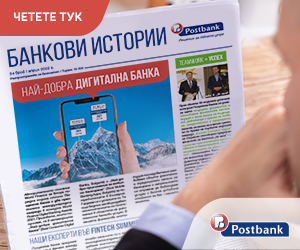Petia, Who Loves Change
Banks profit from our tendency to entrust them with our money. Conversely, they lose if we do not take risks. This complex balance of interests requires skills and qualities that are not learned overnight. It is a process. And the processes at Postbank are best managed by Petia Dimitrova – who has been the CEO of the bank in Bulgaria for 12 years and has over 21 years of experience in the sector.
Leadership as a Concept
Petia Dimitrova quickly closes the gap and aims to delve into the essence of the conversation. She leads it effortlessly, with a broad smile, and a crystal-clear understanding of the value of time, which should not be wasted even for a second.
The fourth largest bank in Bulgaria, with nearly 20 billion leva in assets and profit of over 320 million leva in 2023, does not allow Dimitrova to spend even a moment on trivialities. This April, Postbank marks 33 years since its establishment and stands among the most dynamically developing financial institutions in the country – with nearly 12% increase in assets and about 50% increase in profit in 2023 compared to 2022, a record year for the entire sector. It also holds 38% of the market in utilized limits on credit cards in the country, recording a turnover of 7 billion leva for credit and debit cards for 2023.
Petia Dimitrova has a favorite maxim: “Fortune favors the prepared mind.” Only those who are prepared and motivated can seize the opportunity and benefit from it, which might appear as mere luck to an observer. Throughout her years in the financial sector, she has never stopped changing and evolving – constantly learning and acquiring new knowledge, and currently investing her free time in a special program at Harvard University for executives and entrepreneurs. “I strongly believe in setting a personal example,” Dimitrova shares, who, as a leader in the bank, insists and requires that employees acquire knowledge to meet the challenges of modern life. “We are the only ones who have an exclusive partnership with INSEAD for training all our employees,“ she proudly states. INSEAD is a French business school that ranks among the top worldwide for MBA and EMBA programs. The program has been active for two years and is exceptionally well received. “Our managers can train at campuses in the USA, France, Singapore through the most innovative programs in various fields,” she adds. Over the years, Postbank has had similar programs with other leading global educational institutions like Bocconi University in Milan. Personally, Dimitova’s hobby is to stay informed and constantly read – from the morning news in Bulgarian and international publications, through books to reports, enabling her to see the big picture for both the company she manages and the sector.
Champions of Transformation
Complex tasks are a passion for Petia Dimitrova. Postbank is among the champions for consolidation and expansion in the Bulgarian banking market, following four successful operations to acquire assets from competitive players. “We have a very effective strategy, and we managed to complete the merger projects extremely quickly; I am proud of my team,” Dimitrova shares. “I oppose lengthy merger processes that become agonizing for those involved. Everything should be clear from the first day and communicated to everyone involved about what is happening,” she asserts. The latest deal was the consumer credit company BNP Paribas Personal Finance, which has now been successfully rebranded as PB Personal Finance. “We see enormous potential in developing the product with the introduction of the latest market concept, known as Beyond Banking,” Dimitrova hints, but does not elaborate. “Beyond Banking” is a term in retail banking that describes processes where a financial institution, through technological innovations, offer consumers a broad range of services, including non-banking ones. The unifying feature is the ease of payment and management of transactions from one place. The challenges are still considerable, mainly of a technical nature, but it is a fact that this is the future for consumers who will benefit from the convenience of innovative services with universal access and full transparency. “Beyond Banking” elevates the customer experience to an entirely different level and is now truly combined with a much more enriching experience from both product and service perspective,” explains Dimitrova. She concludes, “I don’t want to reveal more; when we are ready, we will enter the market and promote it. We are preparing meticulously and uncompromisingly.”
Building teams and sustainable development are also hallmarks of her management. Postbank continually wins awards as a preferred employer and as a company that systematically invests in its staff. “For me, the most important thing is diligence and consistency. Over the years, we have worked hard and maintained a strategy that has not changed. And we plan to continue on this path,” Dimitrova shares, adding, “Our goal has always been and continues to be to be among the leading banks. The good thing is that we gain the trust of both our shareholders and the group (Eurobank Group), as well as the entire team – the people we work with.”
Before the Euro, After the Growh
2024 is shaping up to be a pivotal year for the banking sector. The increasingly likely introduction of the euro in 2025 signals a new era in its development. Over the last 30 years, our financial institutions have gone through all the stages associated with the challenges of transitioning Bulgaria’s economy from planned to market-based—from the chaotic and high-risk beginnings through the turmoil of banking failures to the consolidation and entry of significant foreign investors into the sector, who have turned it into a reliable and stable guarantor of the country’s economic future. However, there is one hindrance that seems to make everyone go in circles, and that is the delay caused by circumstantial factors in Bulgaria’s adoption of the euro. Petia Dimitrova is definitive: “If there is one industry that will be ready and is working incredibly hard, it is the banks. Regardless of political decisions, for us, the date is January 1, 2025, and we will be ready.”
Joining the eurozone will radically change the way banks operate in the country. Bulgaria will transition from a currency board system to participation in the common monetary union. This means that the current indirect mechanisms for controlling government spending will be replaced by the fiscal rules of the EU. Currently, the law explicitly prohibits the central bank from financing the government or municipalities in any form. However, in the eurozone, the Bulgarian state, as well as the banks, will have a real lender of last resort, which will be a significant change for a country that has successfully maintained a currency board for over 25 years. “The ECB (European Central Bank) has a lot more money than the state,” explains Dimitrova, and she does not hide her belief that this entails more benefits than risks. “Entering the Eurozone really opens up many new horizons for us,” she further explains.
Indeed, the benefits of introducing the euro are substantial for the banking sector. “Currently, we are in the banking union, we comply with everything, but we get no benefits, we are not at the decision-making table,” Dimitrova explains and points out: “It’s unreasonable that Bulgarian government bonds have a 25% risk weight this year, and next year 50%, instead of 0%.”
For the past year, Petia Dimitrova has also been the chair of the Association of Banks in Bulgaria (ABB). In this role, she has restructured the industry organization towards four main strategic directions—preparation and readiness of the sector for the introduction of the euro, digitization, cybersecurity, and improving the financial literacy of the population. “We want to launch a campaign that is informative about the euro, because we firmly believe that this is the direction for Bulgaria,” Dimitrova shares. The ABB is already working closely with the Ministry of Finance and the Bulgarian National Bank on communication initiatives about the benefits of adopting the euro.
Digital, Physical, and Different
While entering the eurozone still depends on political actions, Postbank is pursuing a clear strategy for development in the coming years. “You know we’ve already made four acquisitions. We do not intend to stop there,” says Petia Dimitrova, adding, “We plan to grow both organically and through mergers and acquisitions.”
Over the next three years, the bank will focus on growth through a serious transformation of processes and the overall customer experience. However, the focus of these efforts is not only on the customers but also on the bank’s employees. A large-scale project is underway for rebranding and updating the offices and branch network. One of the most modern climate-ventilation systems on the Balkan Peninsula operates at the headquarters of the financial institution.
“However, we are focused on our core business—banking,” Dimitrova points out. “We are proponents of the Phygital model,” she explains. This term is a combination of Physical and Digital. Without underestimating the influence and significance of digitization—in which Postbank is a market leader—the company aims to provide a next-generation experience for customers who prefer to visit a bank branch. The path of transformation is clear—for basic banking operations like transfers, currency exchanges, or statements, customers will increasingly use the bank’s digital channels. The branch is becoming a place for higher value-added services—credit consultations, investment advice, etc. “It’s like a pendulum,” explains Dimitrova: “We’ve been through this period where we said Fintech would kill the banks, close them down, there wouldn’t be any, branches would disappear, everything would be done with a click, with the phone, and so forth.” Currently, one of the largest American banks, JPMorgan Chase, is opening 500 new bank branches. “When you look, no industry is completely leaning towards digitization,” exclaims Petia Dimitrova. The leading factor for everyone is the customer experience, and it simply must be different from what it was in the past.
Cybersecurity is a huge topic for banks, which invest significant resources in developing various solutions and protections against hacker attempts and other criminal acts. “For better or worse, Bulgaria is a small market that isn’t as interesting to hackers,” Dimitrova smiles. “It takes efforts, resources, and people to become a target of such interest. Fortunately, Bulgaria is not in that segment.” Nonetheless, digital security systems are a key area of development for Postbank.
We also talk about the integration of artificial intelligence in the financial sector and the benefits it will bring. Given the substantial investments the bank is making in the digital transformation of its processes, the application of cutting-edge technologies like regenerative artificial intelligence and large language models on its processes is more than natural. “There is huge benefit—not only for front office activities but also for our back office operations,” Dimitrova asserts, noting the introduction of these technologies in credit administration, Complaints Department, and Risk Assessment. The bank is also one of the first in the Bulgarian market with its chatbot EVA, based on artificial intelligence technology, which is proficient in both Bulgarian and English. The service is focused on communication, providing clients with the opportunity for real-time consultations. “In professions like ours in areas and fields with repeatability of service, product, tasks, and processes, ML (Machine Learning) and AI will have an extremely large effect and this is a top priority for us.”
The Bank of the Future
All these efforts are driven by the global perspective on the sector. We ask Petia Dimitrova where she sees banks in 10 years. She pauses for a few seconds: “It’s difficult to predict a decade ahead, but in any case, we are heading towards consolidation. Whether for better or worse, banking is increasingly becoming a basic service that is universal for the customer. Only more investments in technology, ESG, and niche products will bring high added value to the process of the bank of the future.” “Everyone has their own life path in dealing with the bank,” Dimitrova is sure. “At different stages of life, you need different things. First, you need an account, then a bank card, then a consumer loan, why not a mortgage? You might seek a loan for your business or even consulting services—and the bank accompanies you in this cycle in one form or another. It won’t just be about clicking and tapping on a screen. The customer experience—from products and services—everything will change to adapt to the changing needs of the next generations,” summarizes the CEO of Postbank.
At the end of our meeting, we touch on the question that is always asked in conversations with her: “What is it like to be a female manager?” However, she smiles and waves it off: “As a woman, I have never been treated as a second-class person. I have always known what I want to achieve and why.” Then she pauses briefly and adds: “Perhaps one of the things that are more burdensome for women is that they need to be mothers as well. It has always been hard for me to find time for my family and my children.”
And what does success mean to her? “For me, success is being in balance and feeling self-satisfaction. I teach this to my children,” she smiles. “I also care deeply that my employees are happy and satisfied because only then can you give your best. When you start veering in different directions, it inevitably affects everything,” she asserts. If she could go back 20 years, would she do anything differently? “No, but I would be more patient,” she exclaims. And in 2024, Postbank continues to evolve. Just like Petia Dimitrova, who loves and seeks change.











